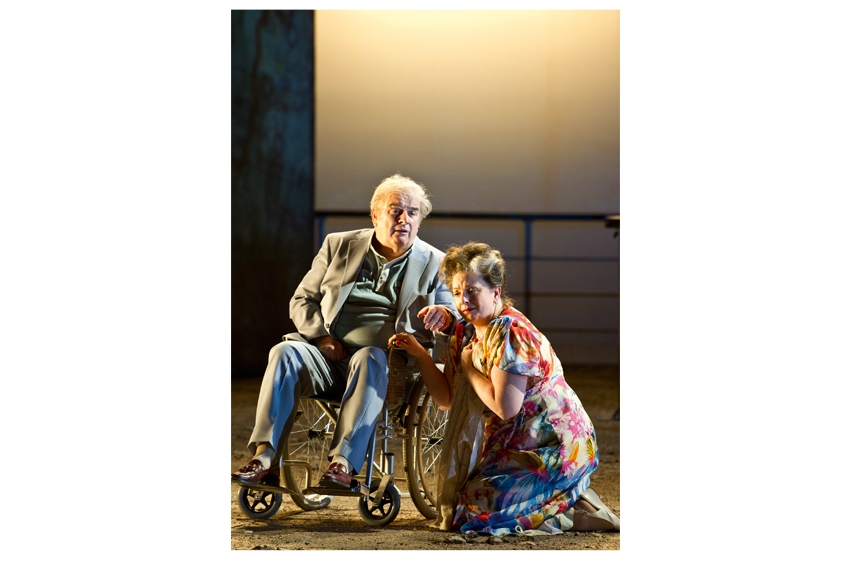There can be no doubting the nobility of John Adams’s intentions in writing The Death of Klinghoffer to a text by Alice Goodman, nor ENO’s courage in putting it on, though they do have a captive audience for minimalist and near-minimalist operas. The work is conceived, as all commentaries tirelessly tell us, in the spirit of Bach’s Passions, in which a dramatic narrative thread alternates with arias of reflection and choruses of penance and grief.
Yet Bach’s purpose was different in kind from Adams’s. Bach could take for granted an audience of unquestioning believers, and his sublime masterpieces embody their faith more powerfully than anything else a Christian has created, so they are immensely potent aids to devotion and reflection; and the most powerful challenge to those of us who don’t believe. The point of Klinghoffer is, by sharp contrast, to present the story of the hijacking of the Achille Lauro as objectively as possible, so that we can make up our minds about the balance of wrongdoing and guilt, which is the reason why the work has been so controversial.
Two questions arise: is an opera a good way to present this pressing issue, or set of issues? And is Klinghoffer in any case really an opera? One might have expected that the narrative would be taut and compelling, but after opening with two reflective choruses, of Exiled Palestinians and Exiled Jews respectively, the Captain of the ship launches into a lengthy account of the terrible events, but clearly from some temporal distance, since he has a penchant for verbose reminiscences of life at sea and is no more pressed for time than Conrad’s Marlow. There is no give-and-take dialogue, the characters make their points imperturbably, and Act I is, as a consequence, soporific.
The tension increases in Act II, and the climax that leads to the death of Klinghoffer is overwhelming, while making us realise the kind of thing we have been missing for most of the opera, a sense of crisis and apprehension. The Aria of the Falling Body that follows is still more moving, but none of it led me to reflect on the Israel–Palestine deadlock. If it had been genuinely dramatised it would have stood a better chance, but I’m not convinced that so complicated an issue could be dealt with helpfully in operatic terms.
ENO’s production and performance are exemplary, with Alan Opie and Michaela Martens ideal as the Klinghoffers, and Christopher Magiera gruffly right as the Captain. I don’t imagine there are many alternative ways to produce this piece, but Tom Morris has seen to it that it is as lucid as it can be. I wonder why the Hagar Chorus, one of the finest stretches of music, and a proper opening to Act II, is omitted?
Dvorak’s most celebrated opera, Rusalka, has at last reached the Royal Opera in a staged version, though if one watched it without hearing the music it would only give away its identity in a few props. The production, by the pair Jossi Wieler and Sergio Morabito, comes from Salzburg, and is moderately ‘advanced’. One could put the issue this way: when you go to a fairytale opera, do you want to see it as that, or do you want to see it given an elaborate interpretation, itself in need of interpreting?
The music unarguably evokes a world of woodland mystery, much of it moderately closely related to Siegfried’s forest. But Barbara Ehnes’s set designs are firmly of interiors, with a ghastly red plastic settee, and in Act III we have a brothel with the witch Jezibaba as the crippled madame, and the girls sitting around in their undies. Rusalka does have a mermaid’s tail to begin with, and there is a huge black cat and later on a real one, whose running offstage produced murmurs of delight and amusement. The upshot of this mixture of what one might expect, on the basis of the text, and the producing duo’s interpretation, is merely incoherent, and makes impossible any kind of stable relationship between the audience and the figures in the opera.
Fortunately, the musical performance is on an exalted level, with Yannick Nézet-Séguin making so powerful an impression in his Royal Opera début that he must surely be invited back very soon. The orchestra played for him with such intensity and sweep that Dvorak’s sometimes faltering dramatic sense seemed infallible. The cast is strong, though only Alan Held as the Water Goblin is ideal. Camilla Nylund’s Rusalka doesn’t have the glamour that some famous and recent exponents of the part possessed, but she makes up for that with utter commitment, breaking through the production’s chill into a heartfelt identification; and in the Prince of Bryan Hymel she has a worthy partner. And Petra Lang takes the action by storm in Act II as the Foreign Princess — Ortrud and Amneris combined.
If only the performance had been scheduled to begin at 7 p.m., as the recent Mozart operas have. This one was scheduled to end at 10.50 p.m., and did, which makes the last act uncomfortable for those of us — surely I’m not alone — who rely on public transport and don’t live in London. But this is an old complaint, and utterly unavailing.






Comments